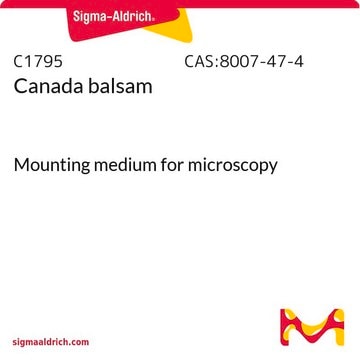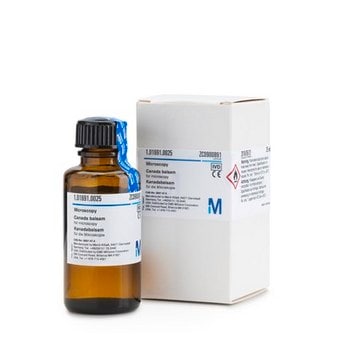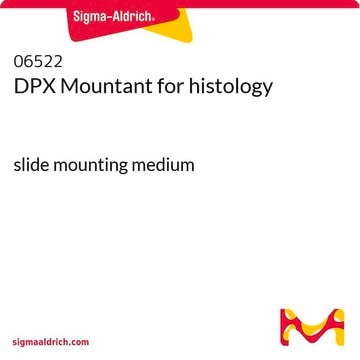60610
Canada balsam
for microscopy
Synonym(s):
Balsam Canada
Sign Into View Organizational & Contract Pricing
All Photos(1)
About This Item
Recommended Products
grade
for microscopy
color
yellow to very dark yellow
refractive index
n20/D 1.47-1.54
n20/D 1.522 (lit.)
density
0.99 g/mL at 25 °C
application(s)
hematology
histology
storage temp.
room temp
Looking for similar products? Visit Product Comparison Guide
Application
Canada balsam is used as a stable apolar hydrophobic mounting medium for light microscopy slide preparation, especially when long term storage is desired.
Signal Word
Warning
Hazard Statements
Precautionary Statements
Hazard Classifications
Flam. Liq. 3
Storage Class Code
3 - Flammable liquids
WGK
WGK 2
Flash Point(F)
102.2 °F
Flash Point(C)
39 °C
Personal Protective Equipment
dust mask type N95 (US), Eyeshields, Gloves
Certificates of Analysis (COA)
Search for Certificates of Analysis (COA) by entering the products Lot/Batch Number. Lot and Batch Numbers can be found on a product’s label following the words ‘Lot’ or ‘Batch’.
Already Own This Product?
Find documentation for the products that you have recently purchased in the Document Library.
Customers Also Viewed
Miklós Bély et al.
Acta histochemica, 108(3), 175-180 (2006-05-23)
The sensitivity and specificity of various Congo red staining methods is very important in the diagnosis of amyloidosis. When using a less sensitive staining method, some true positive cases of amyloidosis remain undetected. A more highly specific method potentially detects
Elena Kirilova et al.
Acta biochimica Polonica, 65(3), 449-454 (2018-08-28)
Benzanthrone derivates are now widely used in many industrial and scientific applications as dyes for polymers and textiles. In biochemical, biomedical and diagnostics investigations benzanthrone dyes are used as a lipophilic fluorescent probe since many benzanthrone derivates demonstrate bright fluorescence
P Gugliotta et al.
European journal of histochemistry : EJH, 36(2), 143-148 (1992-01-01)
beta-galactosidase, revealed by an indigo blue reaction product, represents a valid tracer in immunohistochemistry. Observations on the instability of the indigo precipitate led us to investigate this phenomenon. We conclude that avoiding of xylene, and mounting of the preparates in
Juyeon Lee et al.
Journal of veterinary science, 10(3), 177-180 (2009-08-19)
The presence of galectin-3 was immunohistochemically quantified in bovine intestines infected with paratuberculosis (Johne's disease) to determine whether galectin-3 was involved in the formation of granulation tissue associated with the disease. Mycobacterium avium subsp. paratuberculosis infection was histochemically confirmed using
Christopher K Holterhoff et al.
Developmental dynamics : an official publication of the American Association of Anatomists, 238(11), 2936-2947 (2009-10-21)
Alpha-actinins are actin microfilament crosslinking proteins. Vertebrate actinins fall into two classes: the broadly-expressed actinins 1 and 4 (actn1 and actn4) and muscle-specific actinins, actn2 and actn3. Members of this family have numerous roles, including regulation of cell adhesion, cell
Our team of scientists has experience in all areas of research including Life Science, Material Science, Chemical Synthesis, Chromatography, Analytical and many others.
Contact Technical Service











